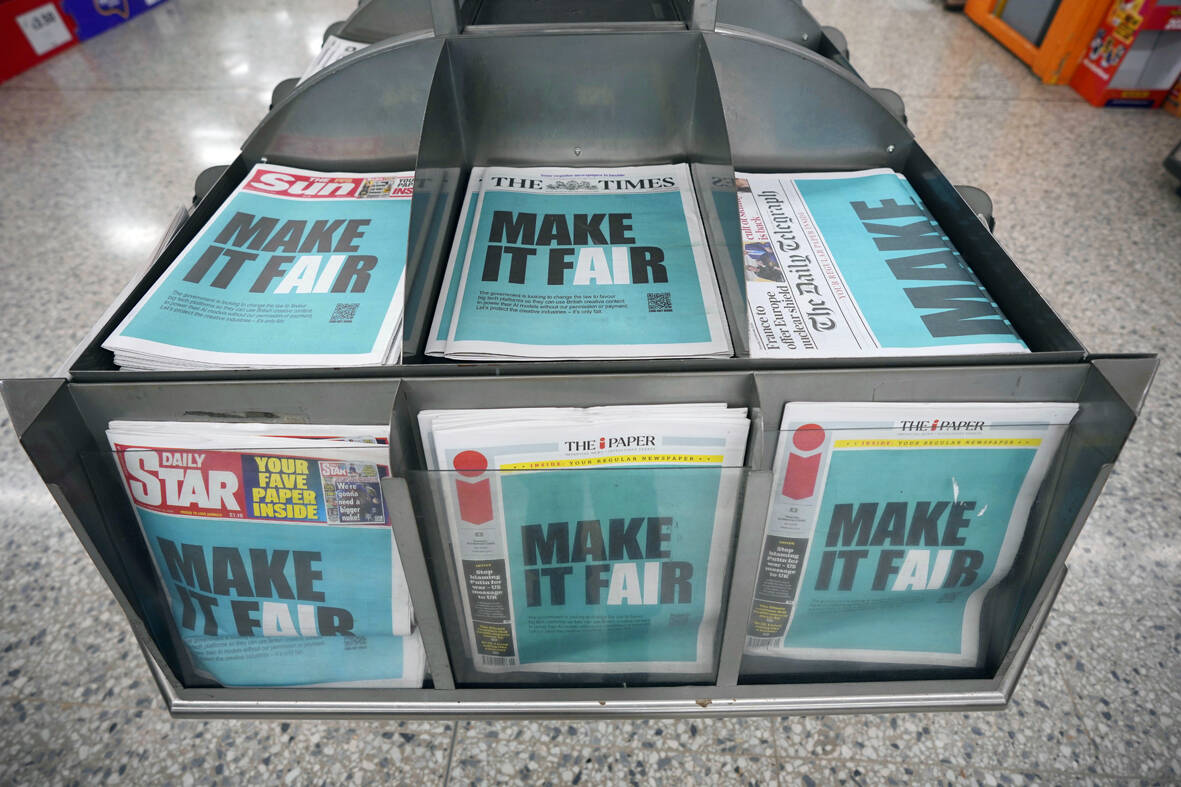More than 1,000 musicians including Kate Bush and Cat Stevens on Tuesday released a silent album to protest proposed changes to Britain’s copyright laws which could allow tech firms to train artificial intelligence models using their work.
Creative industries globally are grappling with the legal and ethical implications of AI models that can produce their own output after being trained on popular works without necessarily paying the creators of the original content.
Britain, which Prime Minister Keir Starmer wants to become an AI superpower, has proposed relaxing laws that currently give creators of literary, dramatic, musical and artistic works the right to control the ways their material may be used.

Photo: AP
The proposed changes would allow AI developers to train their models on any material to which they have lawful access, and would require creators to proactively opt out to stop their work being used.
The changes have been heavily criticized by many artists, who say it would reverse the principle of copyright law, which grants exclusive control to creators for their work.
“In the music of the future, will our voices go unheard?,” said Bush, whose 1985 hit Running Up That Hill enjoyed a resurgence in 2022 thanks to Netflix show Stranger Things.
The co-written album titled Is This What We Want? features recordings of empty studios and performance spaces to represent what organizers say is the potential impact on artists’ livelihoods should the changes go ahead.
A public consultation on the legal changes closes later on Tuesday.
Responding to the album, a government spokesperson said the current copyright and AI regime was holding back the creative industries, media and AI sector from “realizing their full potential.”
“We have engaged extensively with these sectors throughout and will continue to do so. No decisions have been taken,” the spokesperson said, adding that the government’s proposals will be set out in due course.
Annie Lennox, Billy Ocean, Hans Zimmer, Tori Amos and The Clash are among the musicians urging the government to review its plans.
“The government’s proposal would hand the life’s work of the country’s musicians to AI companies, for free, letting those companies exploit musicians’ work to outcompete them,” said organizer Ed Newton-Rex, the founder of Fairly Trained, a non-profit that certifies generative AI companies for fairer training data practices.
“The UK can be leaders in AI without throwing our world-leading creative industries under the bus.”

Towering high above Taiwan’s capital city at 508 meters, Taipei 101 dominates the skyline. The earthquake-proof skyscraper of steel and glass has captured the imagination of professional rock climber Alex Honnold for more than a decade. Tomorrow morning, he will climb it in his signature free solo style — without ropes or protective equipment. And Netflix will broadcast it — live. The event’s announcement has drawn both excitement and trepidation, as well as some concerns over the ethical implications of attempting such a high-risk endeavor on live broadcast. Many have questioned Honnold’s desire to continues his free-solo climbs now that he’s a

As Taiwan’s second most populous city, Taichung looms large in the electoral map. Taiwanese political commentators describe it — along with neighboring Changhua County — as Taiwan’s “swing states” (搖擺州), which is a curious direct borrowing from American election terminology. In the early post-Martial Law era, Taichung was referred to as a “desert of democracy” because while the Democratic Progressive Party (DPP) was winning elections in the north and south, Taichung remained staunchly loyal to the Chinese Nationalist Party (KMT). That changed over time, but in both Changhua and Taichung, the DPP still suffers from a “one-term curse,” with the

Lines between cop and criminal get murky in Joe Carnahan’s The Rip, a crime thriller set across one foggy Miami night, starring Matt Damon and Ben Affleck. Damon and Affleck, of course, are so closely associated with Boston — most recently they produced the 2024 heist movie The Instigators there — that a detour to South Florida puts them, a little awkwardly, in an entirely different movie landscape. This is Miami Vice territory or Elmore Leonard Land, not Southie or The Town. In The Rip, they play Miami narcotics officers who come upon a cartel stash house that Lt. Dane Dumars (Damon)

Today Taiwanese accept as legitimate government control of many aspects of land use. That legitimacy hides in plain sight the way the system of authoritarian land grabs that favored big firms in the developmentalist era has given way to a government land grab system that favors big developers in the modern democratic era. Articles 142 and 143 of the Republic of China (ROC) Constitution form the basis of that control. They incorporate the thinking of Sun Yat-sen (孫逸仙) in considering the problems of land in China. Article 143 states: “All land within the territory of the Republic of China shall